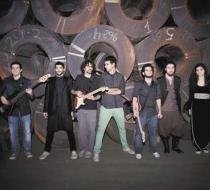Lebanese art rockers creating the soundtrack to the Arab Spring Favorite
Beirut, Lebanon (CNN) -- They've been described as the voice of their generation -- though not one that everyone is comfortable hearing.
Mashrou' Leila, whose name translates as "The Night Project," is a controversial alternative rock band from Lebanon, whose music has served as something of a soundtrack to the Arab Spring for many young people throughout the region.
Formed at the American University of Beirut in 2008, the multi-confessional, seven-piece band has won a legion of fans throughout the Middle East with lyrics that speak to the daily realities and aspirations of young Arabs, frankly addressing taboo topics such as politics, sexuality and religion.
The group was simply interested in making music that honestly reflected its members' experiences, keyboardist Omaya Malaeb told CNN.
"The things we talk about, for us, they're not anything very extreme or very unusual. They are really realistic situations that each one of us goes through."
The group was given rich material to mine simply by the daily realities of life in the Lebanese capital, described in the band's online bio as a "city that tastes of the absurd," characterized by chronic insecurity and full of "musical bombshells, incoherent sexuality and thrusting pleasure."
"Our daily lives were the major inspiration, being young people and part of a changing country trying to form its future in a very sensitive period," said guitarist Firas Abu-Fakhr.
Read more: Lebanese women take on judges who call rape a "marital right"
This contrasted with much of the mainstream pop from the region, which shied away from addressing anything substantive in its lyrics.
"The people who produce pop music... don't really deal with any topics that really relate to real daily issues," he said.
But not everybody has appreciated their approach, said Malaeb, the sole female member of the band. "For other people, this seems a bit too bold," she said.
The band's expressive music has earned them their share of critics as they have risen to prominence.
In 2010, when the group became the first Lebanese act to headline the Byblos International Festival -- one of Lebanon's largest music events -- then-Prime Minister Saad Hariri reportedly left midway through the performance, after the band played a song with swearing in the lyrics.
Read more: Tackling Lebanon's racism problem
Lead singer and songwriter Hamed Sinno said the group does not actively court controversy, but is not interested in toning down their act to win mainstream approval.
"It's not like we try to bother people. But we haven't really tried to inhibit ourselves," he said.
"I guess that we haven't tried to censor ourselves bothers people, because we're rather explicit about the world -- sometimes in ways that are disagreeable for a lot of people."
Most controversially, he says, "we're rather explicit about our sexuality."
Sinno is openly gay, a rarity for performers in a region where homophobic attitudes prevail. He has draped himself in a rainbow flag onstage, and written lyrics from the perspective of a gay lover in songs such as "Smell the Jasmine."
It reflected the band's goal to transcend stereotypes, and create art that communicated the complicated realities of a new generation in the Middle East, said Malaeb -- an honesty that has seen Mashrou' Leila perform to fans in Tunis, Cairo, Abu Dhabi, Amman and even Novi Sad, Serbia.
"Lebanon has more to offer than the commercial music that you hear on the radio," she said. "We're trying to do something that speaks more to us."
From Arwa Damon, CNN
updated 9:35 PM EST, Wed February 27, 2013
CNN.com







